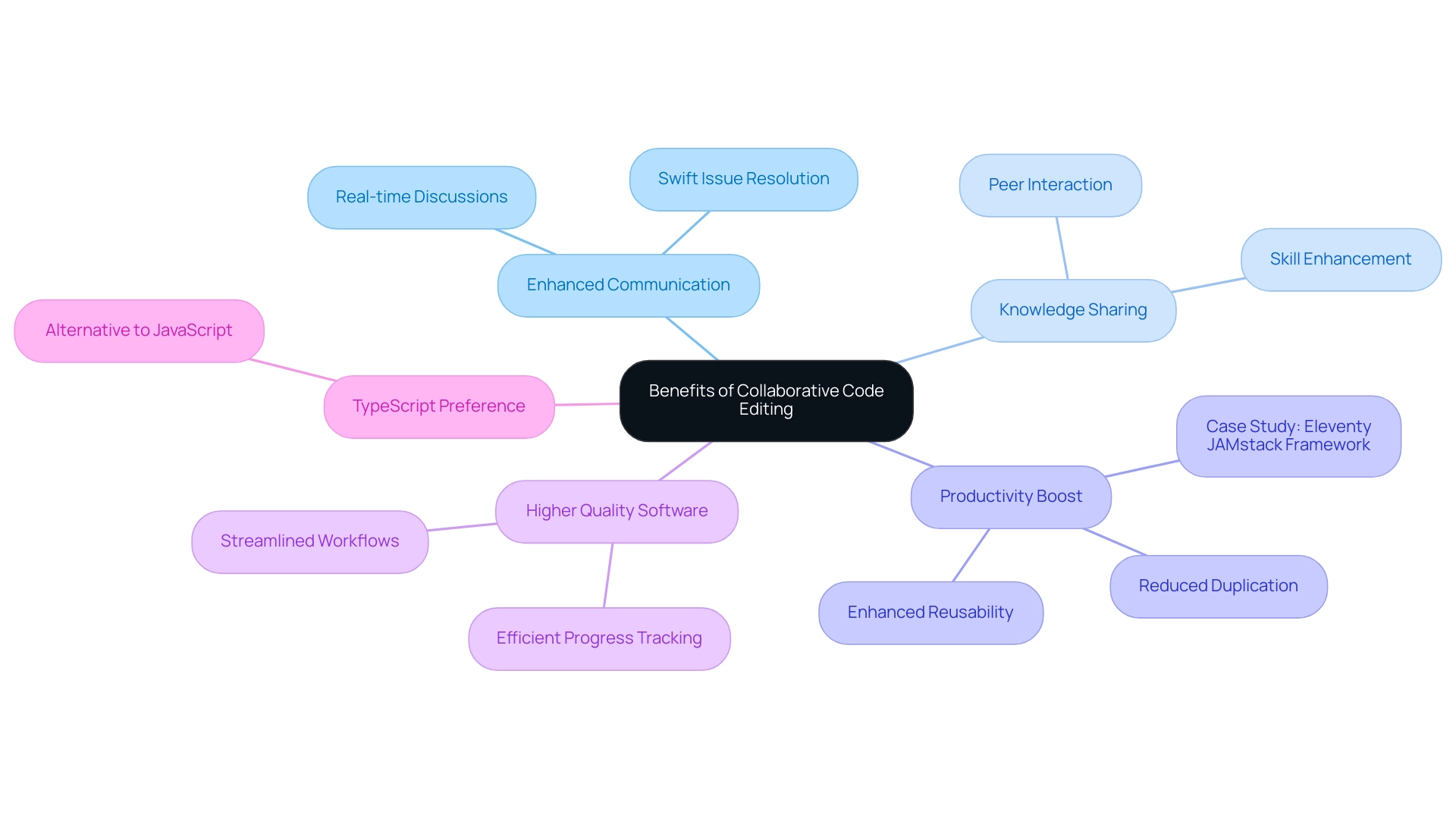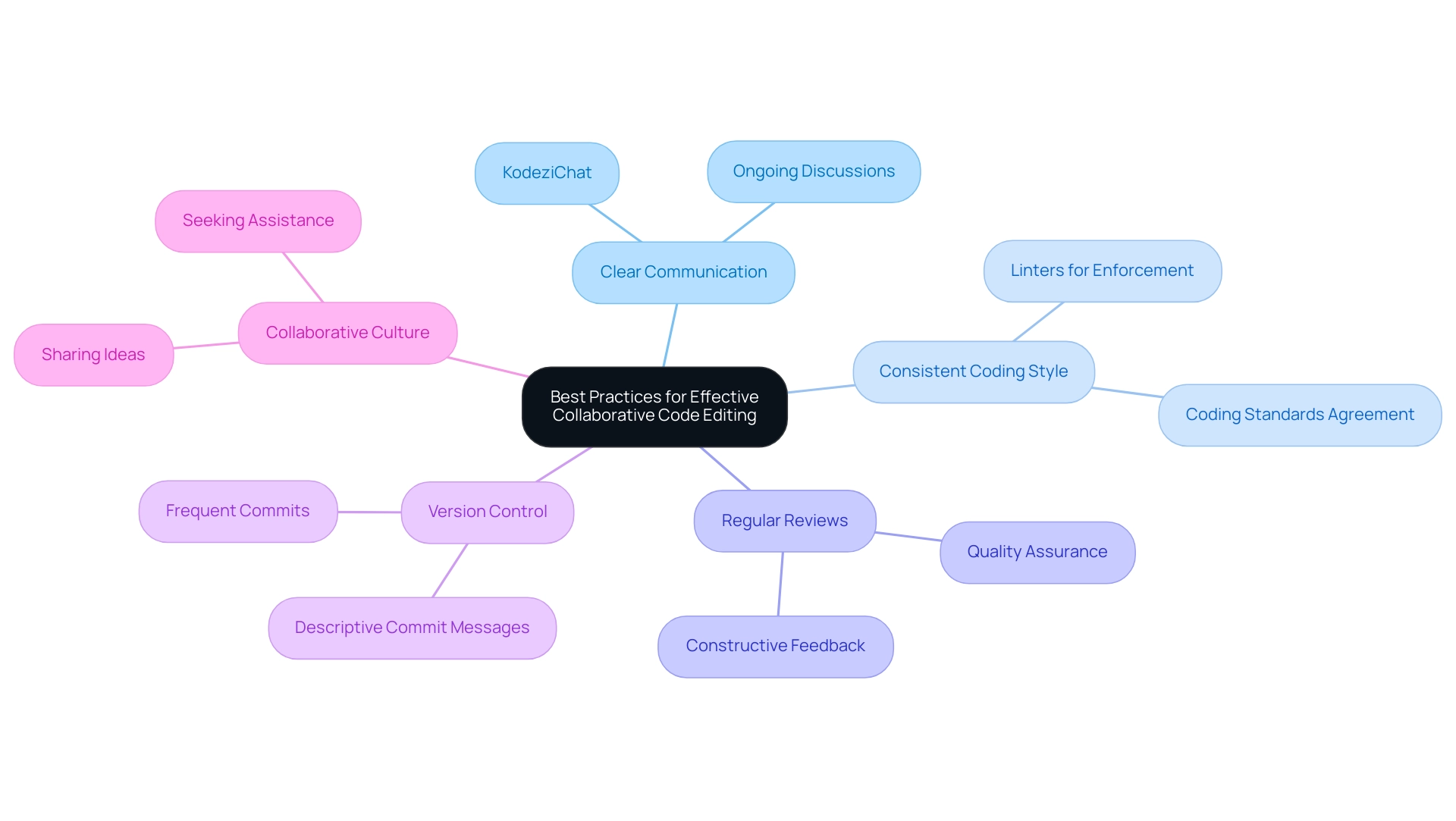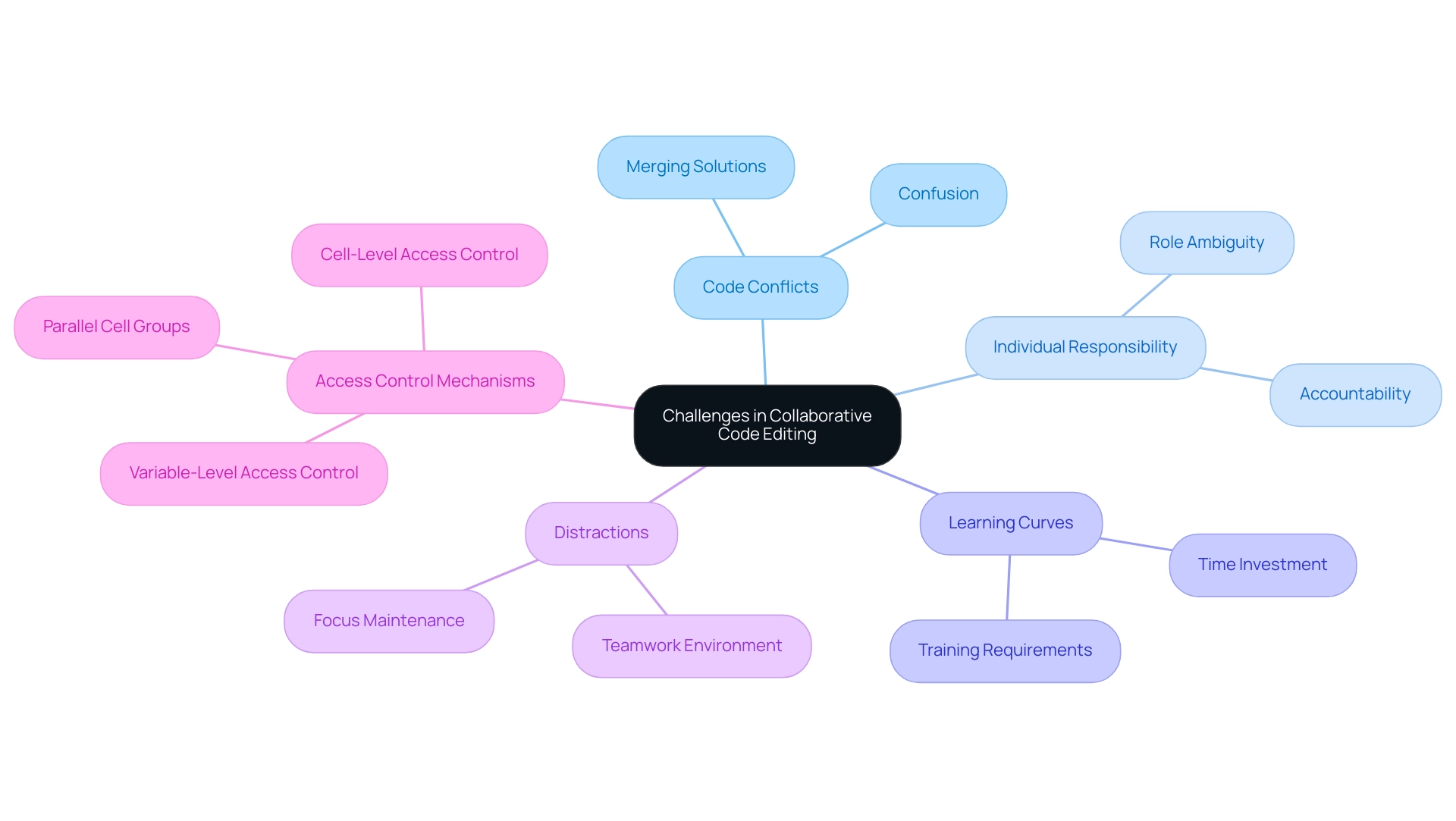Introduction
In the rapidly evolving landscape of software development, the ability to collaborate effectively can make or break a project. Collaborative code editing has emerged as a powerful approach that allows developers to work together in real-time, enhancing communication, problem-solving, and overall productivity.
With advanced tools like Kodezi at their disposal, teams can streamline their workflows, automate tedious tasks, and focus on what truly matters: writing high-quality code. As organizations increasingly recognize the value of teamwork and shared knowledge, the integration of collaborative coding practices becomes essential for driving success in today's competitive environment.
This article delves into the nuances of collaborative code editing, exploring its benefits, best practices, challenges, and the promising future that lies ahead.
Defining Collaborative Code Editing: An Overview
is where multiple developers engage in real-time cooperation on the same codebase. This interaction is powered by advanced tools and platforms that facilitate collaborative code editing, along with commenting and version control. Such environments facilitate collaborative code editing, allowing developers to observe each other’s changes instantly, which fosters enhanced communication and accelerates problem-solving capabilities.
The significance of automated testing in agile development further improves software quality and integrates seamlessly with release processes, ensuring that teams can deploy changes confidently. Instruments such as these not only automate review processes but also synchronize API documentation and generate OpenAPI specifications, enhancing management of the codebase through efficiency. Kodezi's automated code debugging features allow developers to quickly fix performance bottlenecks, identify security issues, add exception handling, and enhance code formatting across the codebase in seconds, making it a versatile tool for enhancing programming productivity.
Notably, NaNLABS employed pair programming techniques in their projects with WootCloud and Amalgam, utilizing Discord for effective communication and collaboration. This method led to enhanced delivery speed and a decrease in technical obstacles, demonstrating how joint efforts can result in substantial advancements in group efficiency and knowledge exchange. As Ulises Jeremiah Cornejo Fandos, a Software Developer at NaNLABS, aptly pointed out,
'There are some techniques that can help avoid wear and improve time management such as the Pomodoro Technique.
This way, Pair Programming doesn’t become a demanding task for the group, as the integration of such strategies, combined with these capabilities, further enhances the effectiveness of collaborative code editing, ensuring that productivity remains at the forefront of software development.
'The CLI acts as a 'Swiss-Army Knife' for programmers, allowing groups to auto-heal codebases efficiently, thereby removing the time wasted on pull requests and boosting overall productivity.
The Benefits of Collaborative Code Editing for Developers
The integration of tools like Kodezi enhances the multitude of benefits that collaborative code editing presents, significantly elevating developer productivity and teamwork. A key advantage lies in enhanced communication; group members can engage in real-time discussions regarding changes, swiftly resolving issues. This immediacy drastically reduces the time devoted to back-and-forth messaging, facilitating quicker decision-making.
Furthermore, collaborative code editing fosters an environment of knowledge-sharing, where less experienced developers benefit from direct interaction with their peers, gaining insights that enhance their coding capabilities. As indicated by 97% of employees, 'the absence of team alignment affects the success of a task or project,' emphasizing the significance of these cooperative practices. Furthermore, the platform's shared tools facilitate collaborative code editing by allowing developers to witness alterations as they happen, which reduces the likelihood of conflicts and leads to a more unified and organized codebase.
For example, in a case study concerning the Eleventy JAMstack Framework, resulted in a successful transition to version 2.0 and the inclusion of several sub-pages, ultimately boosting productivity through decreased duplication and enhanced reusability. The incorporation of Kodezi's strong tools for collaborative code editing, including the CLI for auto-healing codebases and KodeziChat for quick coding question resolution, streamlines workflows, simplifies task management, and significantly enhances progress tracking. Ultimately, these advantages contribute to producing higher-quality software and a more efficient development process, empowering teams to not only meet project deadlines but also surpass expectations.
Furthermore, with TypeScript acknowledged as a favored option to JavaScript for web development, the tools and practices utilized in joint coding settings can further enhance the effectiveness of the development process.

Best Practices for Effective Collaborative Code Editing
To achieve optimal outcomes in collaborative code editing, developers should implement several best practices supported by the powerful tools from Kodezi. First and foremost, establishing clear communication channels is crucial; leveraging tools such as KodeziChat can facilitate rapid resolution of coding questions, significantly enhancing ongoing discussions and ensuring that everyone is aligned. Furthermore, maintaining a consistent coding style across the group is essential for improving readability and minimizing confusion.
Groups should collectively agree on coding standards and utilize linters to enforce these guidelines effectively, as this can significantly impact productivity. Regular reviews are another vital practice, offering opportunities for constructive feedback and ensuring high quality in programming. Additionally, the CLI allows teams to auto-heal codebases, reducing the time spent on pull requests and streamlining the debugging process.
Kodezi Code serves as a versatile tool for enhancing programming productivity by automatically correcting code and optimizing workflows, acting as an autocorrect for programming rather than just an autocomplete feature. The effective use of version control systems cannot be understated; developers should commit changes frequently, accompanied by descriptive commit messages to clarify the purpose of each update. A case study on frontend frameworks highlights how integrating tools like React and Next.js can improve , demonstrating the practical application of these best practices.
Finally, fostering a culture of collaboration and openness inspires team members to share ideas and seek assistance when necessary, resulting in a significantly more productive coding environment. As noted by Martin Baun, a Tech Lead and Founder, 'Thanks for explaining this in detail!'—a sentiment that underscores the value of clarity in communication, further enhanced by Kodezi's AI-powered capabilities.

Challenges in Collaborative Code Editing
Collaborative code editing presents a myriad of advantages but is not without its challenges. A prominent concern is the occurrence of code conflicts, especially when multiple developers attempt to edit the same file at once. Such scenarios can lead to confusion and errors if not effectively managed.
Recent research indicates that all participants in a study created parallel cell groups when faced with a less efficient collaborator, with 2 out of 14 participants opting to merge their solutions into the main notebook. This statistic underscores the necessity for structured protocols for merging changes and resolving conflicts. Furthermore, as noted in a recent investigation, "common obstacles in collaborative code editing" necessitate effective access control mechanisms to support conflict-free editing.
The risk of diminished individual responsibility in joint environments can hinder group productivity; developers may rely too heavily on their peers, leading to ambiguity in roles. Establishing clear responsibilities is crucial in maintaining accountability. Additionally, navigating new teamwork tools often presents a steep learning curve, requiring investments in time and training to ensure all team members can contribute effectively.
Ultimately, distractions inherent in teamwork settings can severely impact productivity, underscoring the need for developers to cultivate a focused work environment, even amidst collaboration. By leveraging access control mechanisms—such as —teams can enhance their teamwork through collaborative code editing while minimizing these challenges. For instance, the case study on 'Variable-Level Access Control in PADLOCK' illustrates how restricting access to shared variables can help manage collaboration, ensuring that lead collaborators can safeguard important data while encouraging safe exploration without risking downstream program integrity.

The Future of Collaborative Code Editing
The future of collaborative code editing is on the brink of remarkable transformation, fueled by advancements in artificial intelligence (AI) and machine learning. Tools like the CLI, the Swiss-Army Knife for programmers, are set to revolutionize this landscape by auto-healing codebases in seconds, allowing developers to focus on innovation rather than wasting time on pull requests. As AI becomes integrated into coding environments, developers can benefit from solutions like Chat, which provides rapid answers to coding questions and finds and resolves code issues almost instantly.
The ongoing shift towards remote work has further highlighted the necessity of collaborative code editing tools, enabling geographically dispersed groups to maintain productivity and coherence. Innovations in cloud-based platforms, combined with versatile offerings, will enable seamless real-time collaboration regardless of location. Moreover, the growing emphasis on DevOps practices will enhance collaboration between development and operations teams, fostering more integrated workflows.
Notably, projections indicate that by 2025, over 500 million apps and services will be developed using cloud-native approaches, emphasizing the significant shift towards low-code and no-code solutions. Companies that embraced low-code capabilities during the pandemic adapted swiftly to remote operations; the case study titled '' illustrates that these platforms are now seen as critical for automation, with 26% of executives identifying them as crucial investments. As these trends continue to evolve, it is imperative for developers to remain agile and receptive to new tools and methodologies, such as Kodezi, that enhance their collaborative code editing experiences.
Conclusion
The exploration of collaborative code editing reveals its transformative potential in the realm of software development. By leveraging advanced tools like Kodezi, teams can engage in real-time collaboration, enhancing communication and accelerating problem-solving capabilities. This dynamic approach not only fosters an environment of knowledge-sharing among developers but also streamlines workflows and minimizes code conflicts, ultimately leading to higher-quality outcomes.
Implementing best practices, such as maintaining consistent coding standards and conducting regular code reviews, further amplifies the benefits of collaboration. However, it is essential to acknowledge the challenges that can arise, including code conflicts and the need for effective access control. By addressing these obstacles head-on, teams can cultivate a productive coding environment that maximizes efficiency.
Looking ahead, the future of collaborative code editing is poised for significant advancements, driven by artificial intelligence and the increasing shift toward remote work. As organizations embrace cloud-native solutions and low-code platforms, the integration of innovative tools like Kodezi will play a crucial role in enhancing collaboration across geographically dispersed teams. The commitment to adopting these practices and technologies will empower developers to not only meet but exceed project expectations, ensuring success in an ever-evolving landscape.
Frequently Asked Questions
What is collaborative code editing?
Collaborative code editing is a practice where multiple developers work together in real-time on the same codebase using advanced tools that facilitate interaction, commenting, and version control.
How does collaborative code editing improve communication among developers?
It allows developers to engage in real-time discussions and observe each other's changes instantly, which reduces the time spent on back-and-forth messaging and facilitates quicker decision-making.
What role does automated testing play in agile development?
Automated testing enhances software quality and integrates seamlessly with release processes, allowing teams to deploy changes confidently and ensuring high-quality code.
How does Kodezi enhance collaborative code editing?
Kodezi offers features like automated code debugging, which helps developers quickly fix issues, and tools that synchronize API documentation, improving overall efficiency in managing the codebase.
What are the benefits of pair programming as practiced by NaNLABS?
Pair programming at NaNLABS led to enhanced delivery speed and a decrease in technical obstacles, showcasing improved group efficiency and knowledge exchange.
What are some best practices for achieving optimal outcomes in collaborative code editing?
Best practices include establishing clear communication channels, maintaining a consistent coding style, conducting regular reviews, and utilizing version control systems effectively.
What challenges can arise from collaborative code editing?
Challenges include code conflicts when multiple developers edit the same file, diminished individual responsibility, and distractions in teamwork settings that can hinder productivity.
How can teams manage code conflicts during collaborative code editing?
Teams can manage code conflicts by establishing structured protocols for merging changes, implementing effective access control mechanisms, and maintaining clear responsibilities among developers.
What is the future of collaborative code editing?
The future is expected to be transformed by advancements in AI and machine learning, enabling tools that auto-heal codebases and facilitate seamless real-time collaboration, especially in remote work environments.
How are low-code and no-code solutions impacting collaborative code editing?
The rise of low-code and no-code solutions is seen as critical for automation and adaptability, allowing companies to swiftly adjust to remote operations and enhance collaborative coding experiences.




